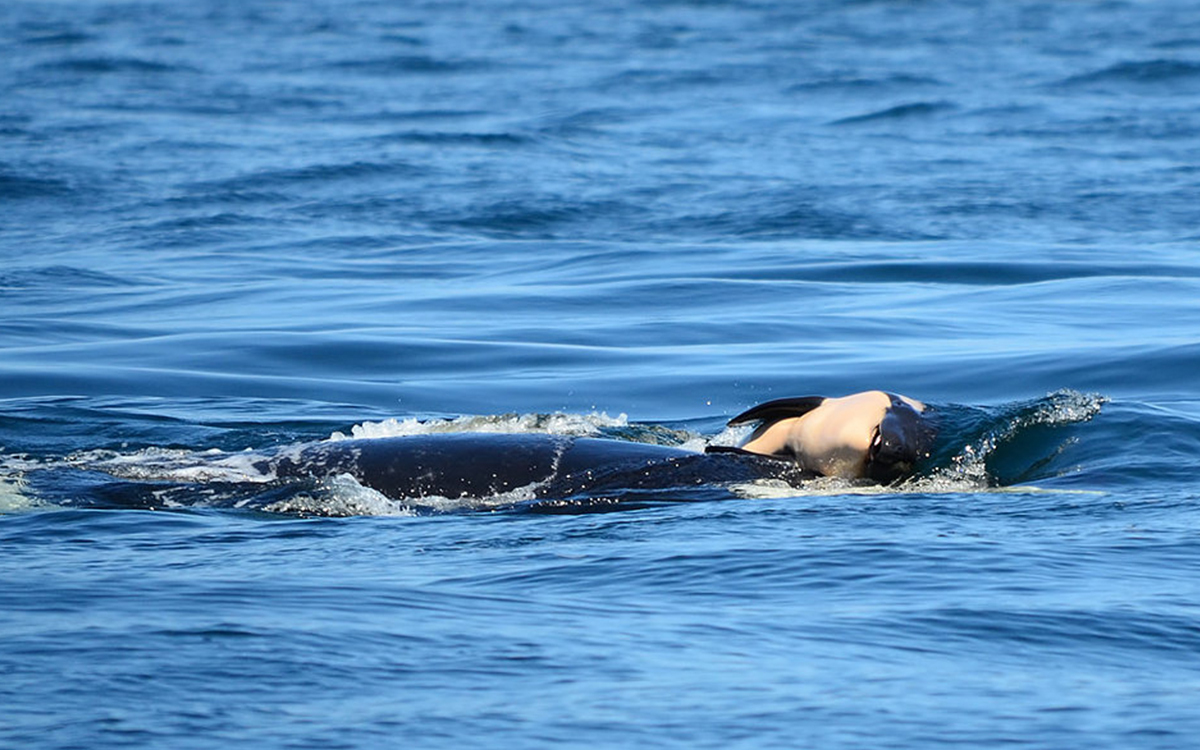

Young mother in mourning, orca J35 Tahlequah had been carrying her baby for more than a week.
The orca J-35, named Tahlequah, lost her baby on July 24th, born for only half an hour, and now cannot bring herself to let her go. She has been swimming, gently pushing the body for more than seven days, swallowed up in her grief. This drama brings to light the unwavering love that binds orca mothers to their calves and their degree of evolution. This indirectly brings us to a double realisation: humans are entirely responsible for their disappearance, and are quite able to remedy to this. Let’s rally together and fight!
Edit:It’s only 17 days after the calf’s death,
than Tahlequah and her pod have eventually been seen without the little body.
A mourning so long had never been observed before.
The breeze is blowing gently, cool, the young bald eagles learn to fly clumsily, they have not yet mastered their large wings. The feathers on their heads are brown, they will soon turn white. Their father, perched on high, screeches out as he defends the nest, and watches his surroundings. Some young harbour seals born this year are warming themselves on the rock at the edge of the water with their parents. Above them, cormorants and guillemots rest between dives. The sun rises gently on San Juan Island, the western border between the United States and Canada. All is calm, there are no waves, boats have not yet begun their daily commute. Kelp sways along in the water, like indolent hair. A sea lion passes in front of the seals, lifts his head out of the water, and goes off again, where he crosses a Minke whale.
In this area of the Pacific, the orca whales of Pod J, are preparing to celebrate a happy event. Tahlequah is 20 years old, and will give birth to her second baby, the labour has begun. The orcas of her family group (pod), are ready to become the godmothers of this eagerly-awaited little one. With the two neighbouring pods, K and L, also managed by the matriarchs, their super pod has only 75 individuals left1, sharing the same dialect and the same territory. 50 years ago, humans attacked their grandparents and aunts, ripping apart families, capturing 45 calves, and brutally killing 13 other orcas in the process, taking them away from the Pacific and their native waters to find themselves in the tiny pools of the dolphinariums. Part of the Endangered Species listed since 2001 in Canada and 2005 in the United States, each birth is a renewal of optimism amonst them (and amongst their supporters)!
Despite this protection, Tahlequah and her family are constantly hungry. Chinook salmon, which they eat almost exclusively, is increasingly difficult to find, disappearing also because of human activities. The body of these large magnificent cetaceans has lately been transformed, feeling the effects of this famine.
For twenty years, only one pregnancy in four proves viable in the Salish Sea … Worse, Scarlet, the last born is already three years old! No birth has yet resulted in a baby surviving. These seventeen months of pregnancy had raised all hopes. It’s the baby of the future, the one that will allow this resident group to perpetuate here. Dreams can come true, she will love this little one, like her mother, Princess Angeline J-17, whom she is so close to, and the same as she loves Notch, J-47, her eight-year-old son.
This black and white baby is so beautiful when she comes to the world! Tahlequah’s heart fills with love, she feels infinite joy. She then becomes this little being totally dependent on her, breathing the air she breathes, swimming at her own pace, looking at what she sees, and rediscovering the world through her eyes, fully maternal. Yet now the unthinkable happens. The little female dies before her eyes, barely half an hour after being born. Tahlequah’s heart breaks … The six females look at the future of the pod, lying in front of them, inanimate. How can one accept that such a drama is possible? Once again…
Then Tahlequah, gently, as in a death march, supports her baby’s head, and pushes it in front of her, delicately so as not to leave marks on her little body. The other orcas surround her. For seven days she has been unable to let her go. Day and night, constantly, this young mother carries the body of her baby, orphan of her. Her family shared a fish, only one, but has she even fed yet?
The impossible mourning of Tahlequah puts us in front of our responsibilities. Amazed but worried about their future, we had met Tahlequah and her pod just two days before the tragedy.
We are determined to take action!
In San Juan Island, we met Ken Balcomb, who has dedicated 43 years of his life to defend these resident orcas. And we also met Lodie Budwill, who together with Ken run the Centre for Whale Research, of which One Voice is a member. They explained to us the drama occurring in this community of cetaceans, the extreme cause being the absence of Chinook salmon – also disappearing – because of dams positioned upstream of the Canadian and American rivers, which prevent the salmon from reproducing by blocking access to their birthplace, the only possible place of spawning for these oh so special fish.
We need you to request the reopening of the dams, including Snake River. Talk to politicians via social media by attaching #FreeTheSnake to your message!
On Twitter: @GovInslee @SenatorCantwell @PattyMurray
On Facebook: @WaStateGov @senatorcantwell @pattymurray
Or write directly to them: Governor Jay Inslee, Senator Maria Cantwell and Senator Patty Murray
1 Estimate from the Center for Whale Research on 1st July 2018
Picture by Michael Weiss, Center for Whale Research